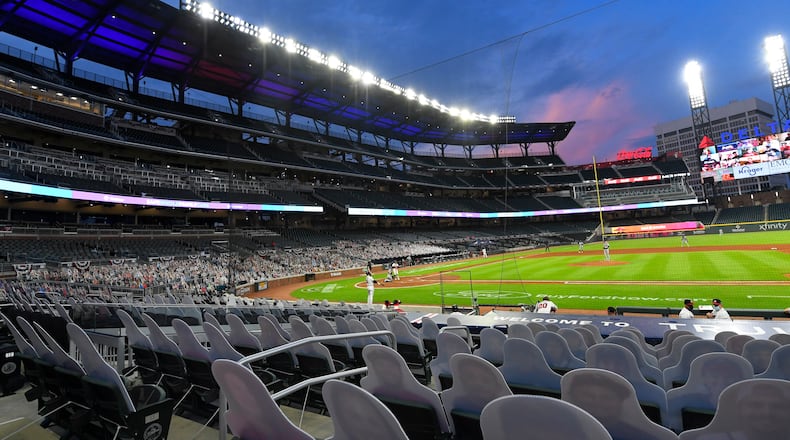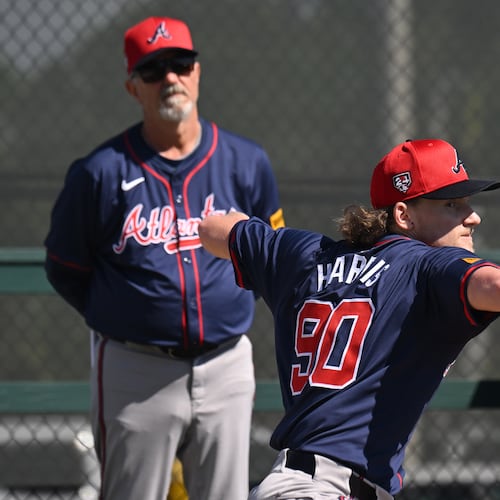Major League Baseball made it to the finish line, completing a pandemic-shortened season and crowning a World Series champion.
Now the sport moves into another period of massive uncertainty: the offseason.
After months of plummeting revenue and widespread layoffs, the Braves and other MLB teams start the offseason — typically an optimistic time of trades and free-agent signings — in a drastically altered landscape.
There’s little, if any, expectation within the game that business will get back to pre-COVID norms in 2021, complicating the roster-reshaping decisions the Braves and other teams must make in the coming weeks and months.
“Major League Baseball teams face a lot of uncertainty because a good portion of their revenue stream (about 40%) is from fans coming to games,” said J.C. Bradbury, a Kennesaw State University economist who has written two books on the business of baseball.
Given the financial losses of 2020 and likely 2021, “I think you’re going to see all teams dialing it back” in offseason spending, Bradbury said.
Here’s a look at some of the issues that cloud the decisions the Braves and other teams must make:
2021 revenue: How to project?
With the 2020 regular season shortened to 60 games and no fans allowed to attend until late in the postseason, the 30 teams took a huge hit to revenue and took on a lot of new debt. Operating losses reportedly will total $3 billion, an average of $100 million per team.
What may weigh even heavier on offseason decisions are concerns about how the 2021 season will play out financially.
Will a 162-game schedule be played? Will teams have fans in the stadiums at the start of the season? If so, will it be a small percentage of stadium capacity, as at the World Series? To what extent will revenue recover?
The answers depend on what happens with the pandemic over the next five months and what restrictions are in place on mass gatherings by next spring. Teams will have to make offseason spending decisions based on uncertain projections, at best. That could mean a slow-developing market as teams try to wait for as much clarity as possible.
Payrolls: headed down?
Many teams, including the Braves, have laid off large numbers of employees on both the baseball and business sides of the organization and have cut other expenses, including salaries of remaining employees. But each team’s biggest expense by far is player salaries, which were prorated for the shortened season this year.
The overarching issue around offseason transactions will be the extent to which teams try to offset the financial losses of 2020 and mitigate the uncertainties of 2021 by reducing their biggest expense.
Most teams likely will cut player payrolls from pre-pandemic levels. How deep the cuts will be isn’t as easily predicted.
Braves president of baseball operations Alex Anthopoulos said last week that his payroll budget for 2021 had not been set.
“We haven’t had that discussion,” he said. "There’s a lot of uncertainty. Will we have fans (in the stadium)? What will revenues be? All those things, right?
“Those are things we’ll have to work through, that uncertainty."
Credit: Atlanta Braves
Free agency: a cold winter?
About 200 players became free agents Wednesday, the day after the end of the World Series, a group headlined by catcher J.T. Realmuto (formerly of the Phillies) and starting pitcher Trevor Bauer (Reds). Free agents can begin signing with new teams after a five-day waiting period.
Outfielder-designated hitter Marcell Ozuna tops the list of free agents from the Braves. The group also includes relief pitchers Mark Melancon, Shane Greene and Josh Tomlin; starting pitcher Cole Hamels; catcher Tyler Flowers; outfielder Nick Markakis; and infielders Adeiny Hechavarria and Pablo Sandoval. The Braves have three days to decide whether to pick up reliever Darren O’Day’s $3.5 million option; if they don’t, he, too, will become a free agent.
The free-agent pool will grow as teams “non-tender,” or decline to offer a contract to, some of their younger players to avoid exposure to potential arbitration awards.
It figures to be a tough market overall for the free-agency class of 2020-21, but if there are a few aggressive buyers, the top-end players likely will find contracts to their liking, eventually. For lesser free agents, it could be a cold, quiet winter.
“You’re willing to sign a player because you think they’re going to help you earn more money, normally through helping you win,” Bradbury said. "If you think you’re going to make less money, then you’re going to be less willing to pay players. I can see it affecting all franchises.
“From a team perspective … they’re going to be less willing to sign some players. You might have some teams think they can get some players at a discount. … You’re going to have lots of players out there looking for work. You might see some players jump at sort of low-ball contracts because of their own uncertainty.”
Trades: New impediments?
The annual general managers' meetings, typically held in November and traditionally a time to initiate trade talks, won’t be held in person because of the pandemic. The winter meetings, historically the peak of trade season, are scheduled for Dec. 6-10 in Dallas, but could be canceled or held virtually.
Trades can be made at any time in the offseason, and the in-person gatherings have become less significant to the process over the years. The reluctance of teams to add payroll or to deal low-salaried young players and prospects are possible impediments to trades, however.
DH: Will NL keep it?
The agreement between MLB and the players' union to use a designated hitter in National League games covered only the 2020 season. Many traditionalists, Braves manager Brian Snitker among them, were surprised to find they liked it. “For years, I wasn’t (for it),” Snitker said. “I’m all for the DH (now).”
But as of now there’s no provision for the DH to continue in the NL in 2021. Changing that would require an agreement between MLB and the Players Association.
It’s another uncertainty that complicates roster-building decisions by NL general managers. As Ozuna’s free agency begins, the Braves don’t know if his best position will exist on their team next year.
About the Author
Keep Reading
The Latest
Featured



